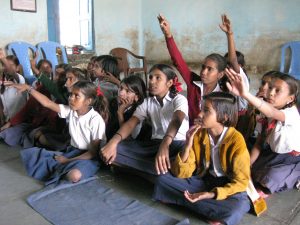Research has repeatedly demonstrated that empowering girls and women significantly accelerates progress in developing economies, and that by nurturing women’s education, entrepreneurial spirit and leadership, whole communities thrive. So how can philanthropy and the socio-economic development sector invest in women in a meaningful manner, one that will bring about positive systemic change?
At The Womanity Foundation, we are firmly convinced that women’s empowerment lies at the core of sustainable development, societal progress and, ultimately, human well-being. We are proving the power of investing in women-focused social ventures and educational initiatives. For example, we are currently piloting unprecedented vocational training courses for Afghan high school girls in computer programming and financial resource management with a view to improve young women’s career chances. We have also created the first commercial women’s radio in the Middle East and are currently scaling the project to a multi-media platform connecting media across the region to co-produce and broadcast contents around women’s role in society and to jointly advance women’s careers in the media.
Womanity was founded by innovative entrepreneur Yann Borgstedt, who utilises his business experience and global network to catalyse collaborations for growth in developing communities around ground-breaking initiatives. Womanity’s project ideas emerge from a need observed in the field and the desire to address it; they are then researched, discussed with peers and potential partners and modelled; in the next phase, the projects are tested and piloted; and finally assessed for their effectiveness and relevance. If there is a demonstrable impact, the model is scaled up or replicated.
Womanity’s WomenChangeMakers (WCM) Fellowship is an example of this approach, whereby social entrepreneurs who work for women’s empowerment are awarded with a three-year support package that allows them to take their venture to scale. Projects are selected based on their viability and their demonstrable benefit to women and their communities. The “Educate Girls” initiative in India is an example where Womanity brokered the professional contributions of Accenture Development Partnerships, Booz & Co., Mercuri Urval and other experts and service providers, often on a pro bono basis, to allow the organization to provide girls access to quality education.
Currently 7,695 schools in India have been impacted through the work of Educate Girls, reaching a total of 1,111,068 girls in 4,500 villages.

Picture credit: Educate Girls – India (2015)
In order to accelerate progress and contribute to social justice for and through women, Womanity is constantly assessing the relevance and impact of the programs it supports and runs, learning from the shortfalls and improving its approach. Every project integrates the monitoring and evaluation of its results from the very beginning. Success is measured against the extent to which projects empower girls and women, and in how they extend their reach and deepen their transformative power, while gaining in self-sufficiency and viability. The foundation gauges the social impact of its activities both internally and through independent evaluations by external experts.
The projects developed and supported by Womanity not only aim to generate sustainable solutions for their beneficiaries, but to be part of a wider move towards shifting attitudes and lifting obstructions to women’s full participation in society, thus impacting on the developing economies as a whole. Research conducted by Booz & Co (a Womanity partner) estimated the extent to which empowering women could benefit GDPs: “For example, our estimates, which are conservative, indicate that if female employment rates were to match male rates in the United States, it would boost overall GDP by 5 percent. (…) In developing economies, the effect is even more pronounced. The United Arab Emirates would see a boost of 12 percent in GDP, and the Egyptian economy would grow by 34 percent.” This research highlights that an approach valuing women’s full, equal and free participation in society can facilitate systemic and sustainable progress, the ultimate goal of philanthropic projects.
By Antonella Notari Vischer
